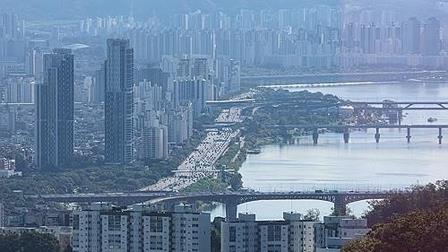
Household Loan Growth Slows Markedly In S. Korea In Sept Amid Tighter Regulations
Banks' outstanding household loans stood at 1,170.2 trillion won ($825.07 billion) as of end-September, up 2 trillion won from a month earlier, according to the data from the Bank of Korea (BOK).
It marks a sharp drop from a 4.1 trillion-won gain seen the previous month, and the slowest growth since March.
Home-backed loans increased 2.5 trillion won from a month earlier to 932.7 trillion won as of end-September, slowing from a 3.9 trillion-won rise the previous month.
Unsecured and other types of household loans fell by 500 billion won to 236.6 trillion won.
Separate data from the Financial Supervisory Service (FSS) showed household loans extended by all financial institutions rose 1.1 trillion won in September from a month earlier, sharply decelerating from the previous month's 4.7 trillion-won gain.
Home-backed loans extended by all financial institutions, including savings banks and insurance firms, went up 3.6 trillion won last month, also slowing from the 5.1 trillion-won increase in August.
Other types of loans extended to households fell by 2.4 trillion won last month, compared with the previous month's 400 billion-won decline, the data showed.
"The impact of lending regulations persisted, while seasonal factors also reduced demand for jeonse financing," a BOK official said. "Reduced credit loan limits also contributed to the drop in other loans."
Jeonse is a unique housing rental system in South Korea in which tenants make a large lump-sum deposit to landlords instead of paying monthly rent.
In a bid to curb soaring housing prices, the government in late June imposed a 600 million-won cap on mortgage loans for home purchases in the capital region and suspended home-backed lending to multiple homeowners.
Amid sustained price gains, the government on Wednesday added 21 districts in Seoul to its list of speculative zones, subjecting all 25 districts in the capital to tougher regulations. It also introduced stricter lending rules, lowering the mortgage loan cap to as low as 200 million won.
Apartment prices in Seoul have been on a steep increase in recent months, especially in neighborhoods around the Han River, fueling speculative demand and accelerating upward price trends, emerging as a key policy test for the new government under President Lee Jae Myung.
Meanwhile, corporate loans went up by 5.3 trillion won from a month earlier in September, also slowing from an 8.4 trillion-won increase a month earlier.
Outstanding corporate loans stood at 1,360.1 trillion won as of end-September, the data showed.

Legal Disclaimer:
MENAFN provides the
information “as is” without warranty of any kind. We do not accept
any responsibility or liability for the accuracy, content, images,
videos, licenses, completeness, legality, or reliability of the information
contained in this article. If you have any complaints or copyright
issues related to this article, kindly contact the provider above.
Most popular stories
Market Research

- PU Prime Launches Halloween Giveaway: Iphones, Watches & Cash Await
- Ozzy Tyres Grows Their Monsta Terrain Gripper Tyres Performing In Australian Summers
- Edgen Launches Multi‐Agent Intelligence Upgrade To Unify Crypto And Equity Analysis
- Zeni.Ai Launches First AI-Powered Rewards Business Debit Card
- M2 Capital Announces $21 Million Investment In AVAX Digital Asset Treasury, AVAX One
- Tria Raises $12M To Be The Leading Self-Custodial Neobank And Payments Infrastructure For Humans And AI.




















Comments
No comment